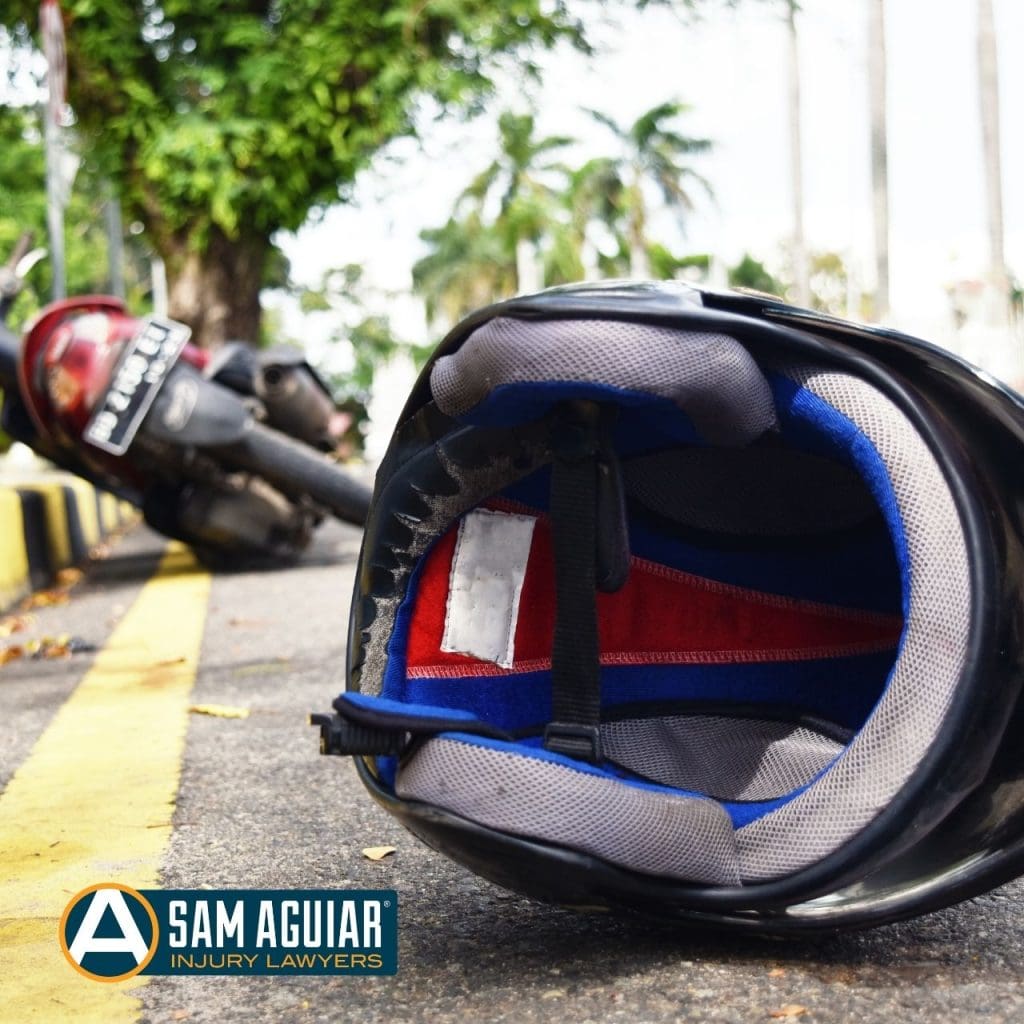
Statistics and Risks
Motorcycling presents significant risks due to factors like reduced visibility and lack of protective structures. Recent data from the National Highway Traffic Safety Administration (NHTSA) highlights these dangers:
Fatalities
In 2022, 6,218 motorcyclists were killed in traffic crashes, accounting for 15% of all traffic fatalities.
Fatality Rate
Per 100 million vehicle miles traveled in 2022, motorcyclists were almost 22 times more likely to die in a crash compared to passenger car occupants.
Helmet Use
Helmet usage among motorcyclists increased from 64.9% in 2021 to 66.5% in 2022.
These statistics underscore the critical importance of safety measures, such as wearing helmets and protective gear, to mitigate the inherent risks associated with motorcycle riding.
Common Causes of Motorcycle Accidents
Motorcycle accidents can occur for a variety of reasons. Some are unique to motorcycles, while others are common to all road users. One of the leading causes of motorcycle accidents is driver negligence. This includes distracted driving, speeding, and failure to yield the right of way. Another common cause is poor road conditions. Potholes, debris, and wet or icy surfaces can be particularly hazardous for motorcyclists. Mechanical failures, such as brake failures, tire blowouts, and engine malfunctions, also contribute to motorcycle accidents.
Here are some of the most common causes of motorcycle accidents:
Driver negligence includes distracted driving, speeding, and failure to yield the right of way.
Poor road conditions: Potholes, debris, and wet or icy surfaces can be particularly hazardous for motorcyclists.
Mechanical failures include brake failures, tire blowouts, and engine malfunctions.
Alcohol and drug impairment: Impaired driving is a significant factor in many motorcycle accidents.
Inadequate rider training: Lack of proper training and experience can lead to accidents.
Understanding these causes can help riders take preventive measures and reduce their risk of accidents.

Protective Gear
Motorcycle riders are exposed to the elements and lack the protective shell that a car provides. Protective gear is crucial for their safety. Helmets are the most vital piece of protective gear. They significantly reduce the risk of head injuries, which are often fatal in motorcycle accidents. Other essential gear includes jackets, gloves, pants, and boots. These can protect riders from road rash, a common injury in motorcycle accidents. Investing in high-quality protective gear can make a significant difference in the outcome of a motorcycle accident. It’s a small price to pay for safety.
Steps to Take After a Motorcycle Accident
Experiencing a motorcycle accident is profoundly traumatic, often resulting in severe injuries that can incapacitate riders, rendering immediate post-accident actions challenging or impossible. This contrasts sharply with typical car accidents, where occupants might retain the ability to perform specific tasks at the scene. Given the heightened vulnerability of motorcyclists, who, per vehicle mile traveled, are significantly more likely to suffer fatal outcomes compared to passenger vehicle occupants, it is imperative to prioritize health and legal considerations following such incidents.
Prioritizing Medical Attention
Due to the severity of injuries common in motorcycle accidents, immediate medical evaluation is crucial. Even if injuries aren’t immediately apparent, internal trauma can manifest later. Prompt medical attention safeguards health and establishes essential documentation for any subsequent legal proceedings.
Filing a Claim
After a motorcycle accident, filing an insurance claim is often the next step. This process can be daunting, especially for those unfamiliar with it. The claim should detail the accident and the resulting injuries. Accurate and comprehensive information is crucial to ensure a fair claim evaluation. However, claimants often face challenges. These can include disputes over the cause of the accident or the extent of the injuries. In such cases, evidence like police reports and medical records can be crucial. Navigating the insurance claim process can be complex. Understanding it can help victims secure the compensation they need. This is another reason legal representation can be valuable in these situations.
Engaging Legal Representation
Given the complexities and serious nature of motorcycle accidents, securing experienced legal representation promptly is vital. An attorney specializing in motorcycle accidents can:
Handle Communications
Manage interactions with insurance companies and other parties, ensuring that statements made do not compromise your claim.
Investigate the Accident
Gather and preserve critical evidence, such as traffic camera footage, witness statements, and accident reports, which might be challenging to collect independently, especially when injured.
Assess Damages
Evaluate the full extent of damages, including medical expenses, lost wages, pain and suffering, and future rehabilitation costs.
Negotiate Settlements
Advocate on your behalf to secure fair compensation, leveraging knowledge of laws and precedents relevant to motorcycle accidents.
Engaging a lawyer swiftly ensures that your rights are protected and that you can focus on recovery while they handle the legal complexities.
Understanding the Challenges
Motorcycle accidents present unique challenges compared to car accidents:
Severity of Injuries
Motorcyclists lack the protective enclosure of a car, often resulting in more severe injuries or death.
Biases Against Motorcyclists
There can be prejudices that assume motorcyclists are reckless, potentially impacting claims.
Complex Liability Issues
Determining fault can be more complicated, especially in multi-vehicle incidents.
Recognizing these differences underscores the importance of specialized legal assistance to navigate the aftermath effectively.
Kentucky Specific Consideration
Motorcycle accidents in Kentucky come with their own set of considerations. State laws and local resources can play a significant role in these cases. Kentucky operates under a “no-fault” insurance system, which does not automatically apply to motorcycle accidents. This can affect how victims recover damages after an accident. Understanding these laws is crucial for anyone involved in a motorcycle accident in the state.
Medical Bills and Financial Consequences
Motorcycle crashes often result in hefty medical bills. These can include immediate emergency care, ongoing treatment, and rehabilitation costs. For many victims, managing these expenses can be a daunting task. Insurance may cover some of these costs, but often not all. Victims may need to explore other options, such as personal injury lawsuits. These can help recover damages to offset medical expenses. Lost wages can also add to the financial burden. If the victim cannot work due to injuries, it can significantly impact their livelihood. This is another area where a personal injury lawsuit can help.
Pain and Suffering
In the aftermath of a motorcycle accident, legal issues often arise. One of these is the concept of pain and suffering. Pain and suffering refer to the physical and emotional distress caused by an injury. They are a key component of personal injury cases. Calculating these damages can be complex, often requiring expert testimony. A personal injury lawyer plays a crucial role in these cases. They help victims navigate the legal process, and their excperience can be invaluable in securing fair compensation. Lawyers can assist in gathering evidence, negotiating with insurance companies, and representing victims in court. Their role is vital in cases involving severe injuries or wrongful death. Understanding these legal aspects can help victims make informed decisions and ensure they receive the compensation they deserve.

Long-Term Impact
Motorcycle accidents can have long-lasting effects. These impacts extend beyond the immediate physical injuries. Many victims suffer from chronic pain. This can result from injuries like fractures, spinal cord damage, or traumatic brain injury. Emotional trauma is another common aftermath. Post-traumatic stress disorder (PTSD) is not uncommon among accident victims. The financial burden can be heavy. Medical bills, rehabilitation costs, and lost wages can strain the budget significantly. Lastly, the accident can affect the victim’s quality of life. They may struggle with daily tasks, hobbies, or social activities they once enjoyed. Understanding these impacts can help victims seek the proper support and compensation.
Staying Informed and Seeking Support
Understanding the impact of motorcycle accidents is crucial. It helps victims and their families navigate the aftermath and informs riders about the risks and precautions. Legal and financial aspects can be complex. It’s essential to seek help from a personal injury lawyer. They can guide you through insurance claims and potential lawsuits. In the end, support from professionals and loved ones is key. It aids in recovery and helps victims regain their lives. Stay informed, seek help, and remember, you’re not alone in this journey.
Get Your Free Case Review
You focus on healing. We’ll handle the fight.
Call now at 502-888-8888
Louisville 1900 Plantside Drive Louisville, KY (502) 888-8888
Lexington 620 W. Main St. Lexington, KY (859) 888-8000
Remember, the insurance company has a team of professionals working to minimize your claim from day one. Shouldn’t you have experienced Kentucky motorcycle lawyers fighting for your rights?










